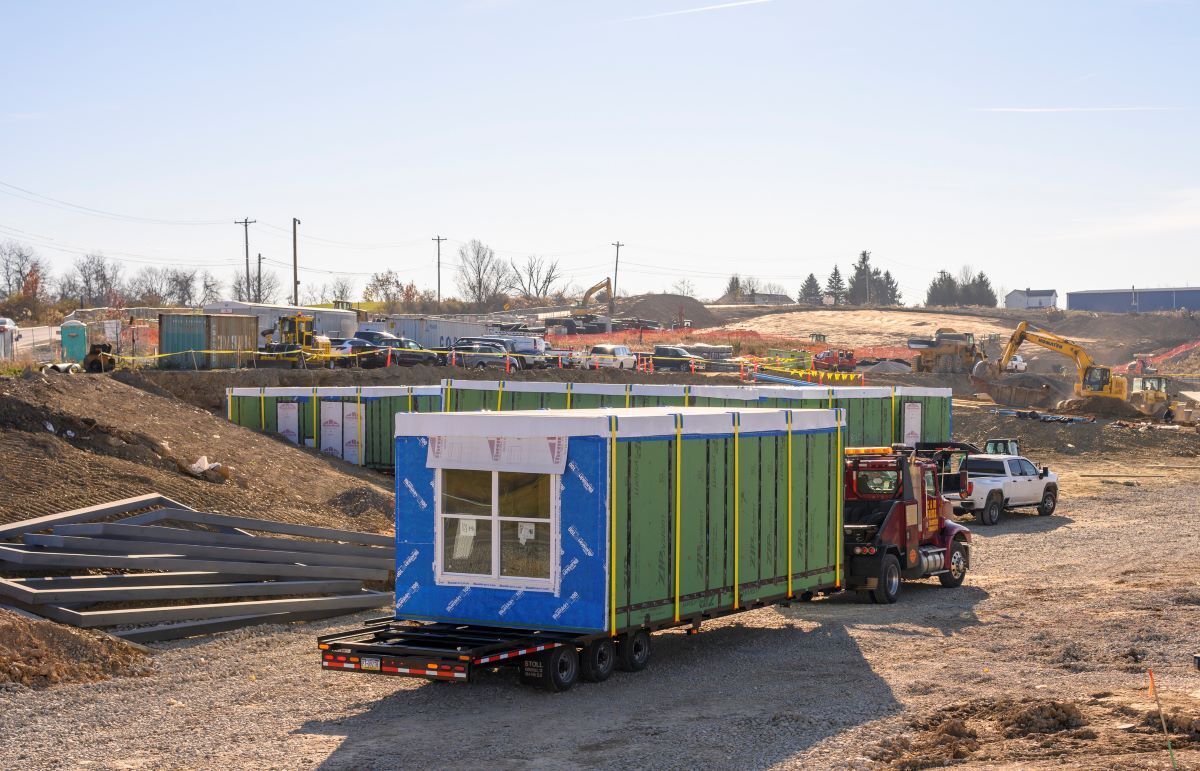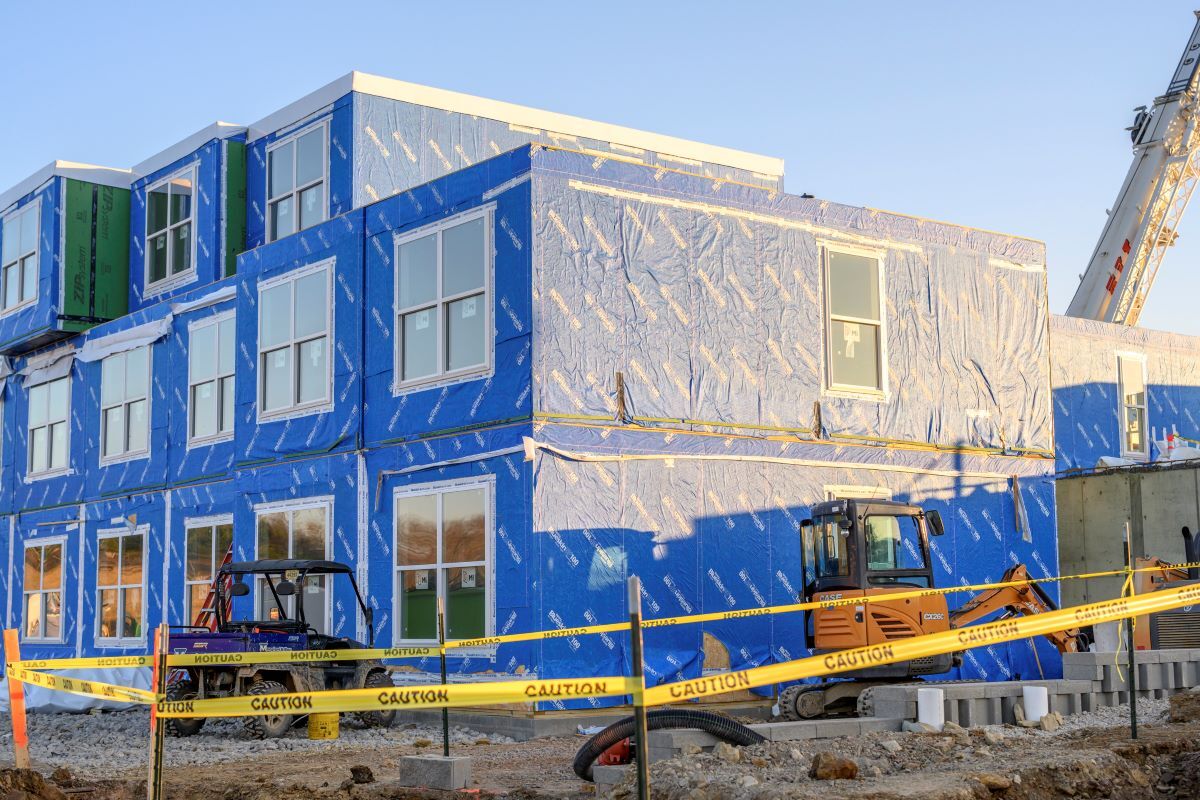The largest U.S. apartment owner is set to open its first multifamily project built with modular structural pieces completed in its Pennsylvania-based factory as it looks to develop a system to counter the rising cost of development while offering moderately priced rents.
Greystar’s Ltd. Findlay, located in Coraopolis, Pennsylvania, consists of 312 units across six separate buildings. Apartments come in a mix of one-, two-, and three-bedroom layouts between 662 and 1,373 square feet. The company expects Ltd. Findlay to open Dec. 2.
Although the project looks like a typical garden-style development both inside and out, it is the first to emerge from Greystar’s Modern Living Solutions, a modular construction factory located roughly 90 miles north of Ltd. Findlay that promises to change how Greystar thinks about development in the United States.
According to the Modular Building Institute, a trade group focused on factory-based building, spending on modular construction topped $12 billion in 2022, the latest year data is available. That amount accounted for more than 6% of all construction starts, the group said, more than triple the amount from 2015. Of those projects, nearly a third were multifamily developments, up from 24% in 2021 and accounting for the largest share of all property types.
Greystar is the biggest of just three companies in the United States developing modular construction capabilities that are vertically integrated as both developers and modular factory owners, according to the Modular Building Institute. The others include Impact Housing in Georgia and Michigan's Ginosko Modular.
“We’re at the forefront of doing something differently,” Andy Mest, managing director of development for Modern Living Solutions, said in an interview. We “realize the opportunity of how we can not only scale our business to another level, but also change the way we deliver housing.”

European influence
Modern Living Solutions is an outgrowth of Mest’s time working for Greystar in the United Kingdom.
During his three years in London overseeing global construction, Mest took in the success Greystar had with a modular approach to building that is more common in Europe — particularly in Nordic countries that experience prolonged periods of inclement weather that make traditional on-site, outdoor construction more difficult. In contrast to on-site, ground-up construction, a typical modular project involves preassembling large sections of a structure inside a factory. Those prefabricated sections are then shipped to the building site and put into place in a fraction of the time.
After returning to the United States in 2018, Mest said he saw an opportunity to leverage modular construction to solve for systemic issues that had crept up in the multifamily industry.
“We had further kind of slipped into the hole of productivity,” he said of his observations of the U.S. market after returning from abroad. “Labor shortages, supply chain issues and complexity, that really kind of opened up an opportunity for us to start thinking about, ‘How do we deliver our projects moving forward?’”
Among the advantages Mest saw in the modular approach was a 25% reduction in insurance premiums, construction times that were 40% faster than traditional apartment projects, and factory productivity levels that doubled that of on-site workers during an eight-hour day.
Controlling costs
Residential modular construction in the United States wasn’t entirely new in 2018. It had been used to create government-subsidized affordable housing for low-income renters and custom single-family houses. But Mest’s mission is to deliver housing at scale and a price that would make a difference to middle-income residents through a cost-effective approach to developing workforce housing.
Leveraging Greystar's size and experience, Mest set up Modern Living Solutions as a vertically integrated company within Greystar to help control many of those costs. That included many upfront charges by third-party factories that often require a 25% deposit and an additional 25% payment when manufacturing begins, early capital outlays that deplete a project’s potential returns.
The approach also reduces labor costs and construction times. Borrowing from concepts in assembly line manufacturing, Modern Living Solutions employees often have very repeatable tasks done at designated workstations.
“They don’t ever have to run to Home Depot to go get a new drill,” Mest said. “They don’t have to go out and pick up material that’s been delivered and carry it up one, two, three floors to get to the location where they’re working, everything is there in front of them.”
Mest estimates that the time saved by eliminating these secondary tasks amounts to doubling productivity in the factory relative to the job site.

In addition, framing and trades work such as plumbing, roofing, drywall, and heating — which are typically done in succession — can be done simultaneously with a streamlined and standardized inspection process. On-site, interior work not done in the factory can likewise proceed at the same time exterior finishes are being completed.
These labor efficiencies lead to faster construction times. If built traditionally, a project such as Ltd. Findlay would probably take 24 months to complete. Leveraging the Modern Living Solutions factory model, it was finished in just 14 months, a rate that is roughly 40% faster.
“That process from probably start to finish on one of the buildings that we're doing out there today, to go from rough into the same stage we're at is probably a seven-month window,” Mest said. “We're doing that in three to four weeks.”
The modular construction process has also impacted building material choices, with a preference for light-gauge steel over wood. While the cost of materials is comparable, savings come from reductions in insurance premiums that Mest said can reach as high as 25%.
Expanding pipeline
Greystar’s Knox factory, which has created more than 350 jobs in the area, is currently the company’s only modular production facility in the United States. And, although the company is exploring options for additional locations, it's pushing ahead with projects in the Northeast and mid-Atlantic that will begin on the Knox factory floor.
Mest said Greystar has close to 15 total modular deals in various stages of its pipeline, including six under contract.
Greystar, which has focused on development and property management in rental housing, logistics and life sciences since its founding in 1993, has grown into the largest apartment owner and operator in the United States, according to the National Multifamily Housing Association.
As of the association’s 2024 rankings, the Charleston, South Carolina-based company owns more than 108,500 U.S. apartments — a 10,000-unit increase from the year prior — with more than 9,100 units in various stages of development.
